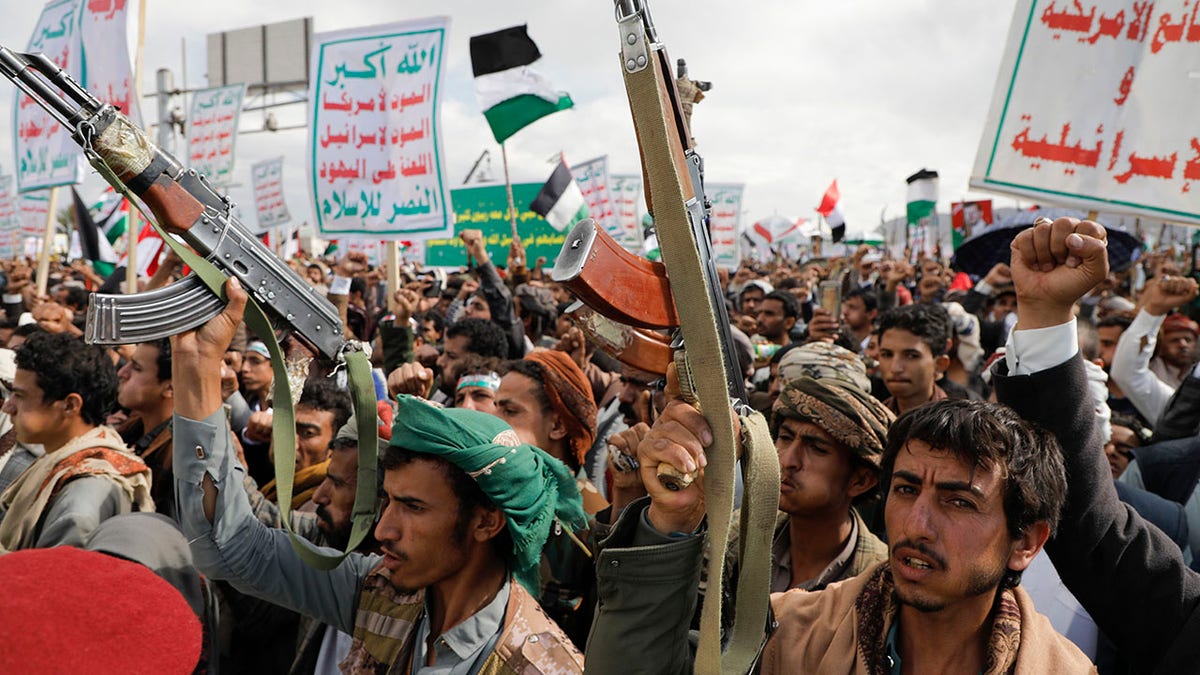Netanyahu says Israel needs precision weapons ‘to avoid civilian casualties’
The Israeli prime minister discussed President Biden’s vow to withhold weapons during an interview with Dr. Phil.
The Biden administration told Congress it would waive sanctions on military sales to several Middle Eastern nations the day before President Biden publicly declared the U.S. would not give Israel offensive aid if it invaded Rafah.
Some of those countries have been accused of playing an active role in the proliferation of Hamas and other terror groups intent on wiping Israel off the map.
The State Department sent Congress a notification Tuesday that it would extend existing sanctions waivers for Lebanon, Iraq, Kuwait, Yemen Libya, Qatar and Saudi Arabia through April 30, 2025, according to a copy of the notice obtained by Fox News Digital Friday.
Biden made the high-stakes ultimatum to Israel's government in a CNN interview that aired Wednesday night as it prepares for a ground invasion of the southern Gaza city of Rafah. The city is home to more than a million Palestinians who left other parts of the Gaza Strip, where Israel has conducted its mission to eradicate the terrorist group Hamas.
LIVE UPDATES: ANTI-ISRAEL PROTESTS ON US COLLEGE CAMPUSES

President Biden is facing bipartisan backlash for drawing a red line on offensive aid to Israel if it invaded Rafah. (Getty Images)
President Biden said Israel would continue to see U.S. support for its defensive systems, like the Iron Dome, in the CNN interview. He added, however, that "if they go into Rafah, I'm not supplying the weapons that have been used historically to deal with Rafah, to deal with the cities, that deal with that problem."
The day before, however, the administration appears to have quietly approved the sale of "defense articles or defense services" to countries the U.S. previously accused of engaging in anti-Israel boycotts, according to the document.
Under current law, the president is permitted to enact and extend sanctions waivers on Arab nations boycotting Israel if the waiver "is in the national interest of the United States" and if the U.S. deems waivers "objectives of eliminating the Arab League boycott."
The notice was first reported by The Washington Free Beacon.
ANTI-ISRAEL TEEN, 16, ARRESTED FOR DEFACING WWI MEMORIAL AFTER FATHER TURNS HIMSELF IN: REPORT

IDF forces stand ready in southern Israel near the Gaza border for a possible ground offensive in Gaza’s southernmost city of Rafah, Southern Israel, May 1, 2024. (Noam Shaar/TPS)
Lebanon is home to terror group Hezbollah, which claimed credit for rocket strikes against Israel as recently as Friday, according to AFP.
In the State Department notice, the Biden administration acknowledges Lebanon has had an active Israel boycott since June 1995 but added as its reasoning for a sanctions waiver, "The waiver’s extension is in the U.S. national interest as it facilitates U.S. support for Lebanese stability, sovereignty, and efforts to undermine violent extremist influences in Lebanon and to strengthen the ability of Lebanese security institutions."
For Yemen, where Iran-backed Houthi rebels have caused chaos in the Red Sea for months in retaliation for Israel’s invasion of Gaza, the Biden administration argued a sanctions waiver was necessary "in our national security interest as we seek to continue working with the Government of Yemen to tackle regional threats — particularly the Houthis."
BIDEN'S HOLD ON ISRAEL WEAPONS SHIPMENT STUNS RETIRED US GENERAL: ‘THIS IS A TURNING POINT’

Houthi supporters attend a rally, in Sanaa, Yemen, March 8. (AP/Osamah Abdulrahman)
Qatar, a wealthy gulf nation on the list, has for over a decade housed Hamas’ top officials, including its leader, Ismail Haniyeh. The arrangement, though requested by the U.S., has come under criticism recently in the wake of Hamas’ Oct. 7 attack on Israel. Qatar is also playing an active role in cease-fire negotiations.
CLICK HERE TO GET THE FOX NEWS APP
The State Department said Qatar’s sanctions waiver "underscores the strength of our bilateral relationship, which is crucial to maintaining security in the region, while also permitting U.S. officials to continue working closely with the Government of Qatar to eliminate further instances of boycott requests."
Fox News Digital reached out to the State Department for comment.











































